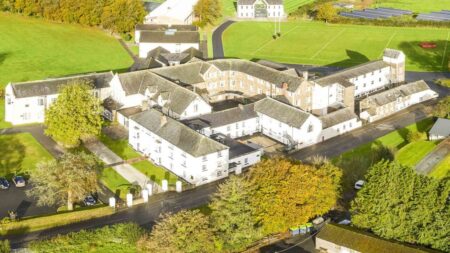Strategy for success

Inspired Learning Group’s chief executive Amit Mehta explains the philosophy behind the 25-strong school group he created over the past 10 years
How do schools succeed? The implementation of tried and tested strategies, an ever-evolving, adaptable and flexible management team, and a belief system founded within family values.
As the chief executive of a schools group, I am privileged to have the responsibility of devising our strategies and ensuring resources are in place to implement them. Above all, my values of honesty, openness and fairness underpin every endeavour.
Our commitment to help every child reach their full potential, innovation, continuous improvement, and setting of targets are always part of an ongoing discussion and evolving review process within our schools.
In the past 10 years, we have acquired 25 settings in the UK, each with their own unique success stories. As Inspired Learning Group (ILG) has grown, I have developed specific methods for managing operations on this scale, formulated through invaluable practical insights and ‘in the trenches’ experience.
At the heart of everything we do is a commitment to quality and excellence in our staff, in our facilities and in our ideas. We believe that those who work and study in our schools should be given the best possible opportunity to flourish in environments which are often much more conducive to progress than in larger settings.
The best leaders
Leaders who are selected to run ILG schools become not just part of the family but also bring with them a mindset that helps create a flourishing learning environment for our pupils. Our leaders are not only child-focused, but possess passion and strong communication skills, the ability to listen, and have integrity and a clear vision. These shared ideals enable our schools to progress to the next level of achievement. By creating an effective, modern and progressive curriculum, we are able to provide learning spaces for our pupils to acquire key skills for the future. Our pupils need to become agile, adaptive to a changing economy, and be able to work within industries that have not yet taken shape or been created.
One such example of an ILG leader is James Nichols, head of St. Francis’ College, Letchworth in Hertfordshaire. His resourceful and inspirational headship cascades throughout the team. Effective top-down and bottom-up communication encourages collaboration and highlights the diverse makeup of the team and its different points of view. This fosters creative ideas and solutions to propel our schools forward, all in a climate of mutual trust, respect and accountability.
This September, James will oversee the implementation of a new innovative curriculum – Curriculum 2024 at St. Francis’ College. Its focus places greater emphasis on the development of pupils’ life skills, including collaboration, creative thinking and critical analysis, while ensuring academic results remain consistently outstanding. The aim is to ensure pupils are equipped to thrive in a future where artificial intelligence and other technologies will be present in the workplace. AI concepts, including machine learning, neural networks and algorithms can all be integrated into the existing STEM or even social studies curriculum to help our pupils adapt and thrive in an ever-changing environment. In this and so many of our schools, it is the adoption of the principle of a growth mindset which encourages pupils to look ahead positively to success in their studies.
Curriculum 2024 is an approach that the school will seek to enhance further to enrich teaching. While we are consistently proud of its academic record, the pastoral care it provides, and the students it produces, we recognise we are rapidly moving forward to a very different and diverse world. Curriculum 2024 is a shift in thinking towards a skills and character-based approach to teaching knowledge and preparing students for exams and the world beyond them; having a personal development programme that is modern, relevant and engaging aimed at equipping young people for life; a focus on careers to highlight the changes in what young people will be doing for work in the future; and a relentless focus on the college’s values of DREAMS.
The DREAMS values: Determination, Resilience, Empowerment, Appreciation, Motivation and Security are what bind the college together as a community. They are the core beliefs which underpin what St. Francis’ College stands for.
The best use of assets
We see that schools are usually an underused opportunity. Yet a school site and its buildings can become a powerful tool to engage the community surrounding it. Over time, the school can evolve into a cornerstone of its locality, encouraging growth and serving as a hub for local gatherings and activities, thus enriching the lives of residents and fostering a sense of belonging and pride. ILG schools are proactively encouraged to host events that are open to the public, including cultural festivals, art exhibitions, science fairs, sports tournaments and music concerts. These events not only showcase pupils’ talents and achievements, but also bring together residents from the surrounding areas.
Many of our schools have historical and great architectural significance within the community, often sharing this history through guided tours and educational programmes that engage residents of all ages. Saint Felix School, Southwold in Suffolk demonstrates a legacy of excellence spanning more than 125 years. It has a rich history dating back to 1897 and has been a beacon of educational excellence for generations.
Beyond academic excellence, Saint Felix School holds social responsibility close to its heart. From assisting Jewish refugees during World War II to supporting Syrian refugees in recent years, we instil a sense of compassion and empathy in our pupils. Saint Felix School embraces its history by hosting historical tours for the local community.
In a recent development we have secured ownership of Shebbear College, a charming school in Devon nestled in 85 acres. The school offers state-of-the-art facilities for performing arts, sports, and music, which provides further opportunities to engage with the local community.
The best benchmarking
In the context of the independent education sector, it is vital for schools to use benchmarking and traffic light systems to assess costs and expenditure relative to industry standards. As we have grown, we have been able to leverage our past experience to inform our strategy for each new school that has joined our group. Economies of scale enable ILG to obtain cost efficiencies, which in turn benefit our parents and pupils.
Benchmarking helps identify gaps in performance and uncover opportunities to improve, including driving education provision, streamlining processes, reducing costs and therefore increasing profit. Ultimately, looking at what needs ameliorating through discussion and analysis enables us to assess each school and establish a coherent direction forward.
A concrete foundation for success is: the use of benchmarking, a balanced scorecard – an effective strategic planning tool, alongside well-defined strategic objectives, and agreed-upon KPIs that are effectively communicated to all stakeholders.
ILG’s position of stability stems from its ability to guide every school towards longevity, through the implementation of strategies and methods that guarantee positive outcomes. We provide each of our schools with continual support and guidance – like an enthusiastic parent, we take great pleasure and pride in nurturing for success, guiding for success, and planning for success.

Amit Mehta
